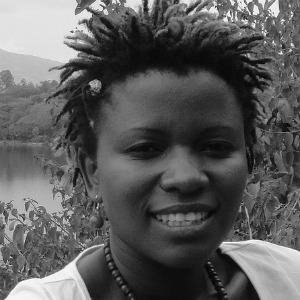BOB GARFIELD: In Uganda, a group of local journalists also relates to YouTube video in response to Kony 2012. The project is called Uganda 2012. Its video is much less polished than those produced by Invisible Children and the U.S. Senate. At the end of the week it had just 3900 YouTube views.
[CLIP]:
MAN: I’ve begun to send Ugandan stories. You want Ugandan stories told and voices high. In this video you will see some of the soldiers fighting for Uganda in response to the Kony 2012 video.
[END CLIP]
BOB GARFIELD: Uganda 2012 contributor Rosebell Kagumire says that the group prefers a few viewers interested in the truth, rather than millions casually consuming a simplistic and misleading story about her country.
ROSEBELL KAGUMIRE: Uganda suffered so much in terms of loss of lives but also a loss of economy. We didn’t have tourists coming here. But now we have recovered. And if we have a movie being watched by a hundred million people, which kind of shows that there’s a war in Uganda, we were worried that that was going to have a big impact.
BOB GARFIELD: Invisible Children’s video was very slick, but more to the point it had a very compelling narrative. Your video has had very, very few views, and I wonder if that’s because it isn’t very slick, and it sure isn’t, or whether there’s – some other element is missing.
ROSEBELL KAGUMIRE: In the Kony 2012, you have this good guy from America and his kid fighting this bad African guy. So it’s easy to make people emotionally charged about some bad guy that they’ve just learned about. We are looking for people to understand that this war is not just emotional. The war is also about which other actors have taken part in it.
Most people, for example, in Northern Uganda, when the film was shown, they said who the hell would wake up and wear Joseph Kony’s name, a shot of a mass murderer. We are not looking to raise up emotions; we are looking to get thoughtful contributions to end this war.
BOB GARFIELD: When your group began to discuss what to do next, was there debate as to whether even to acknowledge the existence of Kony 2012? Or did some say, no, let’s use this opportunity? Did others say, oh, how can we even dignify it with a reference? I mean, what was the conversation?
ROSEBELL KAGUMIRE: This campaign came because it was in response, but it’s not limited to that, so the whole Kony 2012 was about capture Kony, capture Kony. But we are concentrating on victims of the war and what they are struggling with and what they hope their future to be.
BOB GARFIELD: What do you believe deserves the world’s greatest focus?
ROSEBELL KAGUMIRE: You know, just like any other war in Africa, once the war has ended, organizations just pack their bags and go and then forget that people have to pick up pieces. You know, the whole entire system was broken down by the war, so people are slowly starting to build systems which are not good enough yet to support them, especially education, health. You know, there’s a major disease now called the Nodding disease.
BOB GARFIELD: This is a neurological disease that affects children between five and fifteen.
ROSEBELL KAGUMIRE: Yes. And we have over 2,000 children across Northern Uganda facing this disease that has no cure. The response was really slow, both from the Ugandan government and from agencies that are working with health. So really, people in Northern Uganda have very serious problems that the world can really help.
BOB GARFIELD: In the end, though, in a funny way, Rosebell, in terms of calling attention to the actual problems in Northern Uganda, do you not owe a certain debt to Invisible Children and the very documentary that you so despise?
ROSEBELL KAGUMIRE: I think that it’s absurd that people who can afford to tell the story correctly choose to tell it the wrong way. So for us, we are here to do that. And if they had been perfect, maybe we wouldn’t have spoken. And so, I don’t owe anything to Invisible Children.
[MUSIC UP AND UNDER]
BOB GARFIELD: Rosebell, thank you.
ROSEBELL KAGUMIRE: Thank you so much.
BOB GARFIELD: Rosebell Kagumire is a journalist in Kampala.

